|
Limitar tu búsqueda
[+–] Compilador o editor
- Abrantes Pêgo, Raquel (2)
- Aguilera, Nelly (6)
- Anguiano Cárdenas, Rosa del Cármen (1)
- Castaleda Zainos, Marcos (1)
- Del Valle Muñoz, Alejandro (1)
- Durán, Luis (3)
- García Castelán, Alfonso (1)
- Garro, Nora (1)
- Giles Valdés, Rafael (1)
- González Rojas, Bertha Alicia (1)
- Hernández Sánchez, José Antonio (1)
- Linares Tirado, Rebeca (1)
- Martínez, Gabriel (3)
- Matute de Díaz, Zoila (1)
- Meléndez, Jorge (1)
- Méndez Suazo, Elmer (1)
- Palmero Zilveti, Olga (2)
- Ponce Aguilar, Luisa (1)
- Reyes Godelmann, Iker (2)
- Sobrevilla, Luis A. (1)
- Suárez, Rosa María (1)
- Valencia, Anel (1)
- Velázquez Franco, Emanuel (1)
[+–] Editorial
[+–] Fecha
[+–] Formato
[+–] Idioma
[+–] Tipo de documento
[+–] Tipo de recurso
[+–] Classification
|

|
|
Impact of school quality on child labor and school attendance: the case of the CONAFE compensatory education program in Mexico
This paper focuses on the impact that two different types of policy interventions, namely enhancing school quality and contingent cash transfers, have on child labor and school attendance in Mexico. While there are many studies on the impact of Oportunidades on schooling outcomes, little evidence is available on whether school quality programs such as CONAFE also reduce child labor and help keep...
|
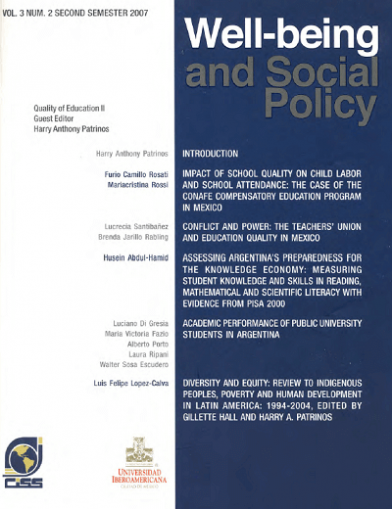
|
|
|
|

|
|
Introduction (about the internatinal conference on "The quality of education in Latin America and the Caribbean")
The Inter-American Conference on Social Security (CISS) and Universidad Iberoamericana (UIA) co-hosted an international conference on "The Quality of Education in Latin America and the Caribbean" in February 2007. The conference examined the quality of education in the region, the determinants of learning, policy and program evaluation, and the impact of quality of education on the labor market....
|
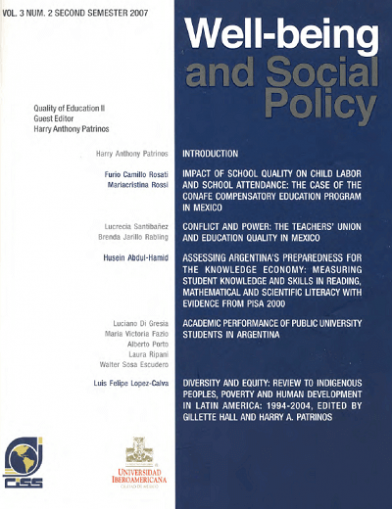
|
|
|
|

|
|
Book review. Improving the quality of education in Mexico: Positions and proposals, edited by Francisco Miranda, Harry Patrinos y Ángel López
This book gathers analyses performed by several authors on policies considered appropriate by the World Bank to enhance the quality of basic education provided in Mexico, in particular, education received by majority sectors in our society (World Bank: 2005).
|
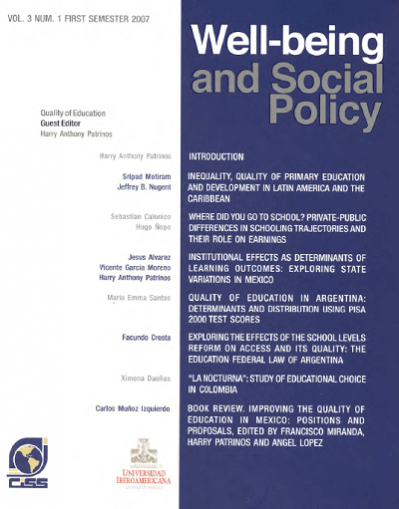
|
|
|
|

|
|
"La Nocturna": study of educational choice in Colombia
This study uses data from Colombia’s 2003 Encuesta de Calidad de Vida to examine how well do electricity strata (proxy for socioeconomic status) explain the choice decision for type of institution and session attended. In the model of choice by type – private vs. public universities – I find that as the electricity strata increases, the marginal probability of enrolling in a public university...
|
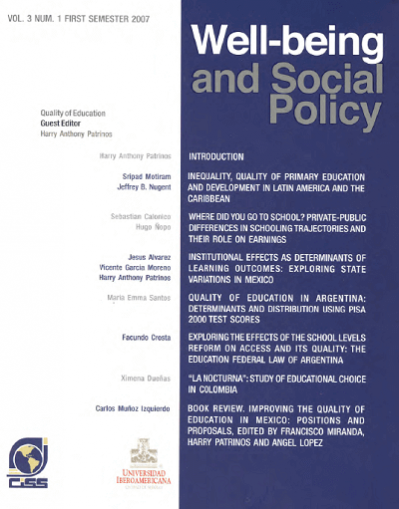
|
|
|
|

|
|
Exploring the effects of the school levels reform on access and its quality: the Education Federal Law of Argentina
Over the last decade, Argentina embarked on a broad education reform, the Federal Education Law (LFE), being its main objective to expand access to basic education, mainly, by a new organization of the schooling level structure with the extension of mandatory schooling from 7 to 10 years. The provinces reactions were heterogeneous. We try to evaluate the relationship among the LFE and access and...
|
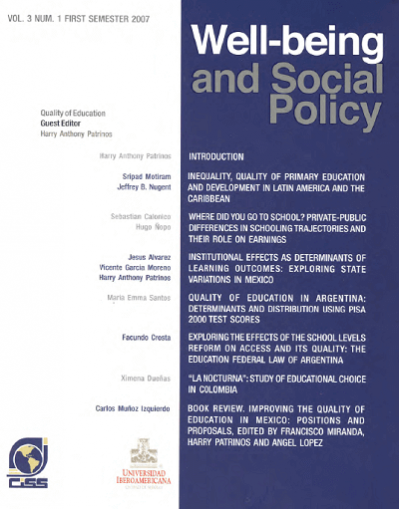
|
|
|
|

|
|
Quality of education in Argentina: determinants and distribution using PISA 2000 test scores
In this paper we study the determinants and distribution of learning outcomes in Argentina I measured by PISA 2000 reading and math test scores. To do that, we estimate education production functions at the mean of the distribution using survey regressions and at different parts of the score 's distribution with quantile regressions. In terms of educational policy aimed at improving learning...
|
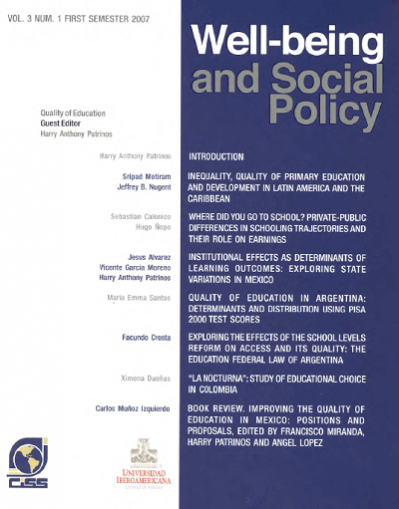
|
|
|
|

|
|
Institutional effects as determinants of leaning outcomes: exploring state variations in Mexico
We use the PISA 2003 student-level achievement database for Mexico to estimate state education production functions. Student characteristics, family background, home inputs, resources and institutions are controlled for. We take advantage of the state-level variation and representative sample to analyze the impact of institutional factors such as state accountability systems and the role of...
|
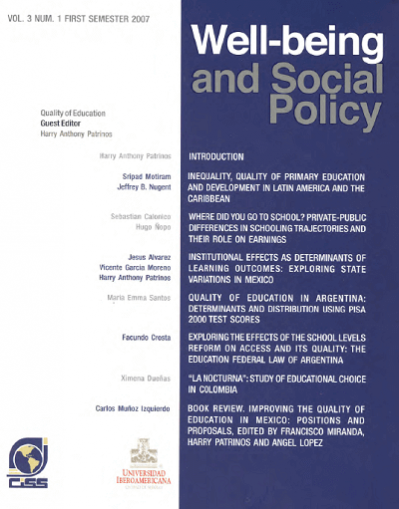
|
|
|
|

|
|
Where did you go to school? Private-public differences in schooling trajectories and their role of earnings
The private provision of educational services has been representing an increasing fraction of the Peruvian schooling system, especially in recent last decades. While there have been many claims about the differences in quality between private and public schools, there is no complete assessment of the different impacts of these two type of providers on the labor markets. This paper is an attempt...
|
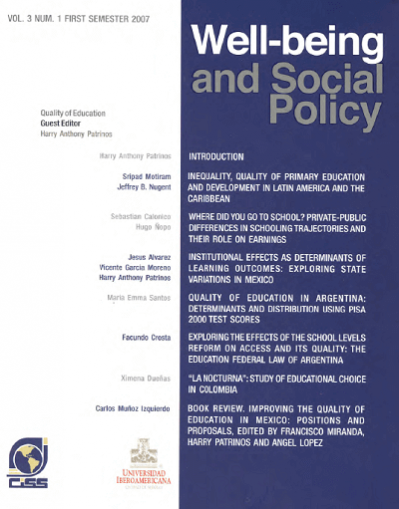
|
|
|
|

|
|
Introduction (about the international conference on "The quality of education in Latin America and the Caribbean")
The Inter-American Conference on Social Security (CISS) and Universidad Iberoamericana (UIA) co-hosted an international conference on "The Quality of Education in Latin America and the Caribbean" in February 2007. The main obj ective of the conference was to examine quality of education in the region, the determinants of learning, policy and program evaluation, and the impact of quality of...
|
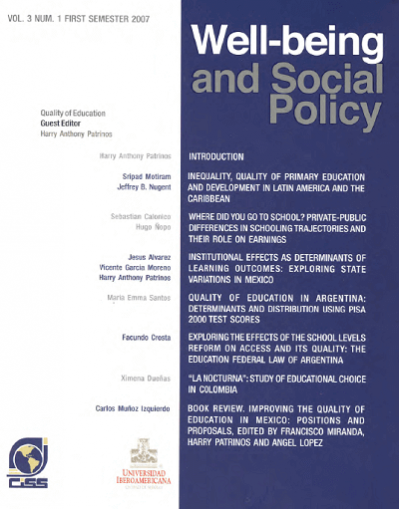
|
|
|
|

|
|
The Americas Social Security Report 2005: labor markets and the fragmentation of social insurance, financing for HIV-AIDS by social security (Book review)
The Americas Social Security Report 2005, published by the CISS, gathers the contributions, opinions, and comments of more than 30 social security specialists from different countries in the American continent, as well as the review of the most recent literature on this matter. The purpose is to present, to specialized public and to laymen, a detailed, analytic, and updated report of the...
|
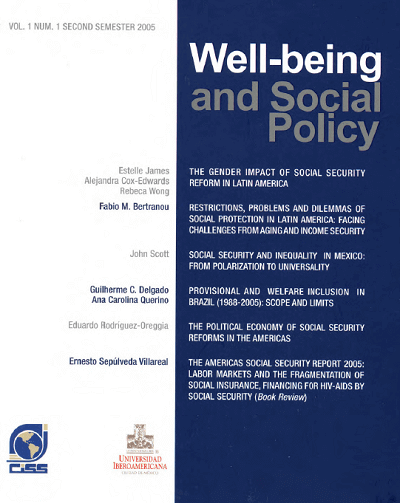
|
|
|
|

|
|
Unemployment insurance in Chile: a new model of income support for unemployed workers
This paper describes the Chilean experience concerning the implementation of a new unemployment insurance (UI) program. The use of individual savings accounts and private management are essential elements. In addition, a redistributive fund (Common Fund) helps workers pool risks, distributing resources from employed to unemployed workers and from stable firms to workers with low incomes and...
|
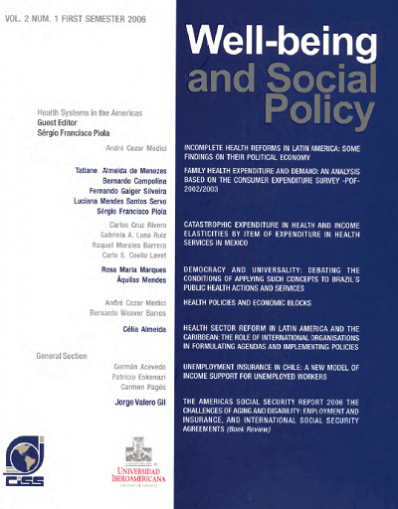
|
|
|
|

|
|
Incomplete health reforms in Latin America: some findings on their political economy
This paper raises the point that only few health reforms implemented in Latin American countries modified the existing health systems in order to fix the problems brought by the institutional fragmentation typical of this sector. A great part of these reforms did not implemented the necessary measures to improve coordination among health systems in the prevailing pluralistic model and besides,...
|
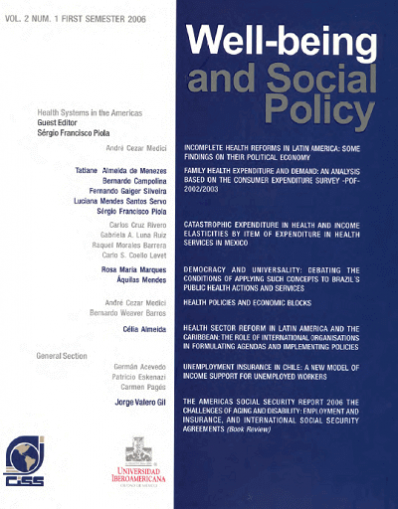
|
|
|
|

|
|
Family health expanditure and demand: an analysis based on the consumer expenditure survey - POF - 2002/2003
This paper aims at analyzing healthcare expenditure and demand of families, by estimating income-elasticity and price-elasticity for ten groups of products using the so-called model Linear Almost Ideal Demand System (LAIDS). The 2002/03 consumer expenditure surveys (POF) of the Fundação Instituto Brasileiro de Geografia e Estatística – FIBGE (Brazilian census bureau) are used, providing extremely...
|
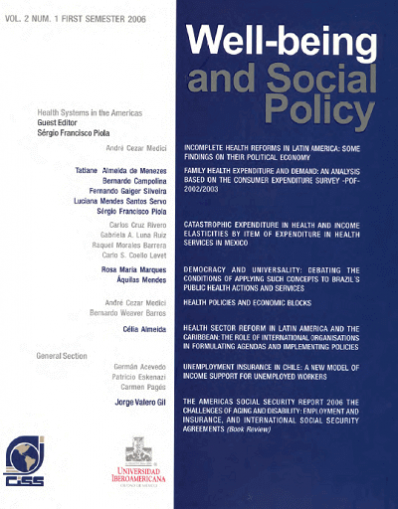
|
|
|
|

|
|
Catastrophic expenditure in health and income elasticities by item of expenditure in health services in Mexico
The objective of this article is to put in economic perspective the expenditure in health within the pattern of family expenditure of the Mexican households. Information of the National Survey on Income Expenditure of Households (ENIGH) of Mexico of 2004 is analyzed on: structure of the expenditure of the households, expenditure in health and income-expenditure elasticities in health; by...
|
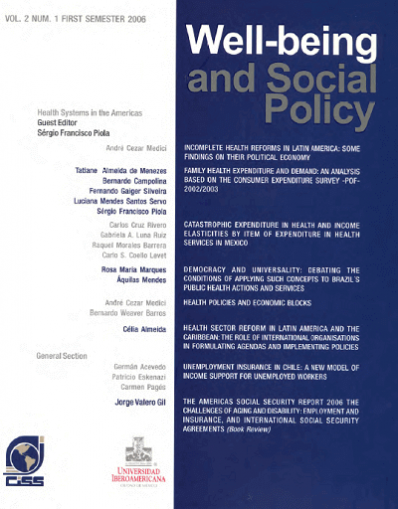
|
|
|
|

|
|
Democracy and universality: debating the conditions of applying such concepts to Brazil's public health actions and services
This paper reviews the determinants and conditionalities of the process of universalizing public health in developed countries, notably the European ones, and in Brazil, and is aimed at highlighting their differences. The first part discloses the main interpretations on the constructing of the Welfare State, emphasizing the characteristics of that historical moment and its articulation with...
|
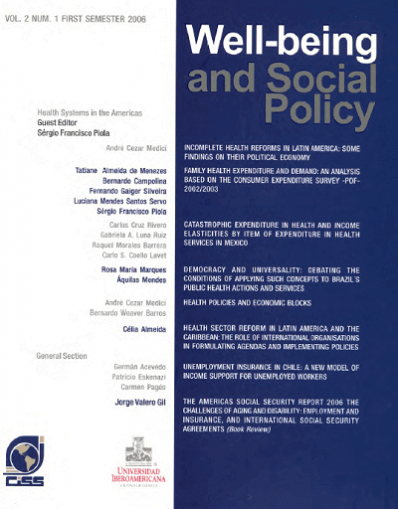
|
|
|
|

|
|
Health policies and economic blocks
This paper analyzes the roles of health goods and services markets within the regional integration process. It is a known fact that the consolidation of integrated markets is slower regarding social goods and services (as health and education) than among other goods and services (e.g. durable consumption goods). The paper discusses the nature of the health sector and its global dimension, showing...
|
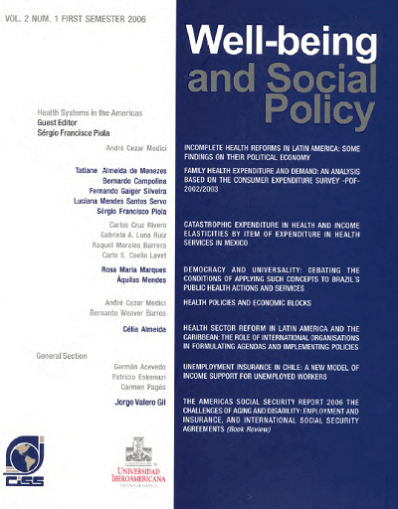
|
|
|
|

|
|
Health sector reform in Latin America and the Caribbean: the role of international organisations in formulating agendas and implementing policies
This article examines health sector reforms in Latin America and the Caribbean to discuss the ideological, theoretical, and conceptual elements that inform the reform agenda and the models put forward for attaining greater equity in the region’s countries. Its starting assumption is that the relevant literature generally neglects the economic, social, and political aspects underlying the...
|
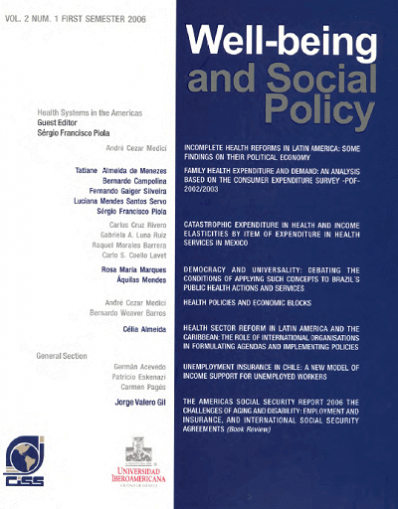
|
|
|
|

|
|
The Americas Social Security Report 2006 The challenges of aging and disability: employment and insurance, and international social security agreements (book review)
The 2006 Issue of the Report on Social Security in the Americas is divided in four chapters. The first two chapters address older-adult issues, the third chapter deals with disability-related problems, and the fourth chapter discusses Social Security agreements in the Americas. In the Presentation, it was pointed out that the objective of the Report on Social Security in the Americas is to become...
|
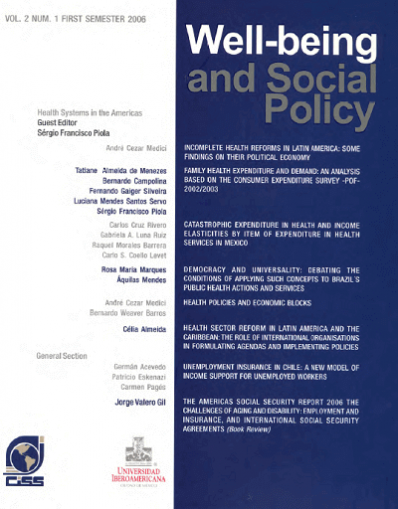
|
|
|
|

|
|
Review of International migration, remitances, and the brain drain, edited by Çaglar Özden y Maurice Schiff
As the volume title suggests, three of the studies deal with the effects of remittances on incomes and measures of well-being, four address various aspects of highly skilled migration, while the remaining paper examines the determinants of migration from rural Mexico to the US. Each of these is certainly topical: the rise in reported global remittance flows has been a major spur to the recent...
|
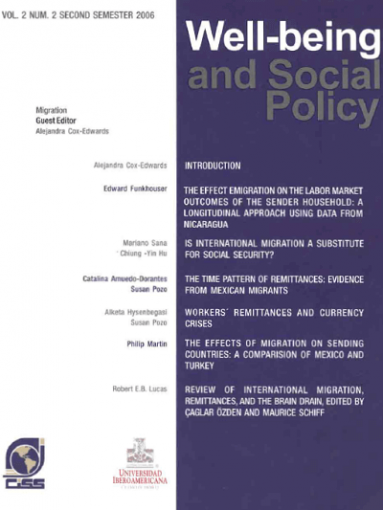
|
|
|
|

|
|
Introduction (about an international conference on "The effects of migration on sending countries")
The Inter-American Conference on Social Security (CISS) and Universidad Iberoamericana (UIA) co-hosted an international conference on “The Effects of Migration on Sending Countries” in February of 2006. The major objective of the conference was to examine a variety of channels through which migration affects the sending countries. Migrants change the dynamic of sending households; alter labor...
|
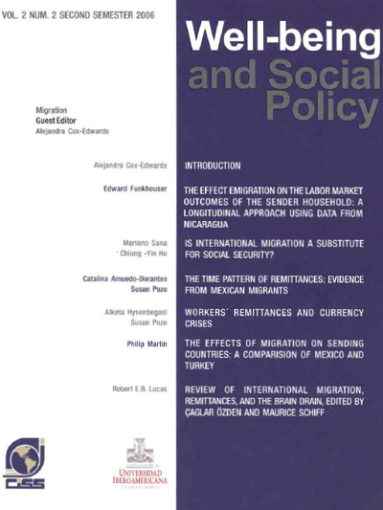
|
|
|
|
|